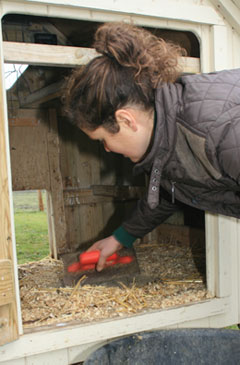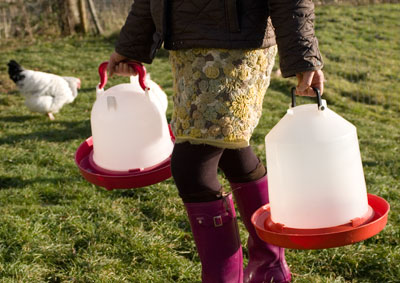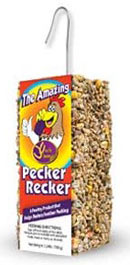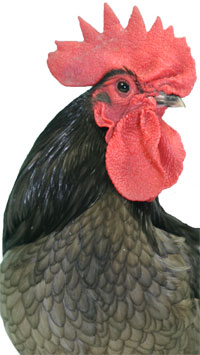Stress is a major contributor to ill health in chickens and can also make them more prone to a number of vices such as feather picking, egg eating, comb or vent pecking.
Chickens kept in intensive conditions are constantly subjected to stress which is why farmers see such high mortality rates and have to pay out to keep birds healthy and make them productive. Fortunately, keeping chickens in our back garden isn’t exactly intensive as long as they have a sufficiently large run or are let out of their run regularly to free-range although there are pleanty of other times when chickens can suffer from stress.
In short, stress is best avoided whenever possible and a little bit of care and forethought can dramatically reduce stress in your birds.
So how do we know what stresses chickens? Well, some years ago, there were studies done that measured the stress hormone ‘corticosterone’ of birds in different situations and it is this research that has enabled us to understand the stressors.
Stressors.
As well as intensive conditions causing stress, the other main stressors can seem quite trivial to us.
- Handling. This is one of the biggest stressors. Chickens are a prey species so naturally, if caught and picked up, they become stressed. Whilst regular handling is important for health checks, chasing a bird around a run for 5 minutes every time will not help. Try to catch birds in a confined area such as a house quickly and calmly. Hold the wings firmly and then transfer the bird to the holding position with your right hand underneath her, breast in the palm of your hand, fingers holding the tops of the legs. Her head should be underneath your arm so her head is looking behind you. Use your left hand to examine her.
- Introducing new chickens. Chickens are flock animals that have a pecking order. It is thought the ancestors to our chickens, the Red Jungle Fowl of South East Asia use the pecking order to assist in their survival. If every bird has her place, when it comes to feeding time, each one can have her turn and they don’t have to spend precious time arguing which may alert predators to their where-abouts. Every hen knows her place in the pecking order and by introducing new birds, the pecking order is upset. No hen knows where she stands and this will cause arguments and considerable stress for days until they have sorted themselves out into a ‘new flock’.
- Lack of food or water. This stress is completely avoidable of course but we all have those one off days when we suddenly realise that our birds have run out of water for one reason or another. A leaky water container, frozen water or just a forgetful moment!
- Extreme heat. Chickens don’t sweat. To cool down, a chicken must either take on cool water (and excrete more to lose the excess fluids and some heat) or pant which removes heat through the air they exhale. Chickens are much better equipped to deal with the cold and can keep their body temperature up by eating more and trapping air inside their feathers to insulate themselves thermally. Heat will cause chickens to become stressed.
- A new environment. This can be taking a bird to a show, getting your birds for the first time or just moving them to a different house or run. Another environmental change that is hard to avoid but causes considerable stress for your birds is when there has been a covering of snow.
- Egg laying. This is surprising since this is a natural things that chickens do but egg laying does cause stress on your hens. Giving them a peaceful, private, darkened nest box can help. Try not to disturb hens that are in the process of laying.
- Predation. Foxes or other predators visiting the garden on a regular basis are likely to cause stress. In the extreme case, after a fox attack, even though a chicken may survive the wounds inflicted by a fox (he grabs a mouth full of her feathers for example and the chicken escapes), she can still die because of the stress.

If you can minimise stress, your birds will be less prone to picking up disease which is something we would all like: happy, healthy chickens!






Hi – great website!!
We have four hens who have produced lovely eggs. We recently introduced a new cock and since then they have moulted, tail feathers are low and are not producing eggs. Could the new bird be the reason? We are going to give the chicken coop a good summer clean and make a new area for laying eggs and I have noticed when they do lay (poor quality – thin shells) they are doing this in our allotment rather than the chicken coop.
Our chicken coop is in an old stone pig pen. They seemed happy there last year. They have the full roam of our small holding during the day.
I have not wormed them. Our local store sold me some organic stuff – should I get the real deal and give it a go? They do not appear to have mites. Can you advise at all?
Many thanks Kate
I use Flubenvet to ensure they are defininely wormed. Hens not going in the house to lay or roost usually means there are red mite bothering them. Check the cracks and corners of the nest boxes.
Poor quality eggs come with age, especially with hybrids like Bovans Goldline / Hyline etc. These produce a huge amount of eggs in the first couple of years and commercially this is what they have been bred for. After that, commercially, they are spent hens. Pure breeds should be better.
Stress can cause chickens to go into a moult. This can be lack or water, a house move or a new bird. The older a bird is, the sooner she will moult. Ensure they have enough food (protein is required for eggs but also for feathers). They should start laying again after moulting as it is still early in the year.
last year we had eggs every day from our three hens. this year we are not getting any. they have free run of the garden with two feeders two water supplies. we feed them mixed corn layers pellets and grit in tubs. the hens are not old. they seem in good health with good appetites.
Are they fat? Look at the breast bone, it should be clear to see behind ‘tracing paper’ skin.
Fat hens don’t lay eggs – remove the mixed corn. This should be a treat only, a handful per day.
Also, check the coop for red mite. These will cause a hen to become anaemic and the first thing she usually does is stop laying.
Hi we got 5 new chickens this week end,,they have setled in well, we have kept our other one in another pen (we had to put her friend down last week),i did let her out for a few minutes at a time with the other ones, but she is realy bad with them, I thought is would have been the other way round and it would have been them who attacked her,how long should I keep them apart, I let the 5 out in to the big run for a coulpe of hours and then I let cluck out on her own for a while, when she is in her pen she makes a lot of noise. I hate seeing her attack the others and pulls out feathers, I know they have to sort things out but she is realy nasty. Is there any thing i can do
Have now put some wire over the pop hole to the small run and put her in there, so now they can all see each other day and night, she still attacks them badley, will she ever be nice to them they only have to see me get her out and they run.
Hopefully in time…. give them a few weeks. Very occasionally there is the odd few that will just never see eye to eye and won’t get on.
You do have to -try- to let them sort it out but if they draw blood, remove them immediately.
Hi thanks for the advise, but I think I may have to find a home for her, as its getting harder to keep them in different pens, and haveing to let them out at different times, as I have to keep the new ones locked up for longer at the moment as My mom is in hospital for last 2 weeks so im going there and not getting back back till after dinner, and will be another 10 weeks yet. Its not fair on them,I love cluck just wish she would not fight so much. If any one knows of any homes for chickens in the west midlands please let me know. Thank you
Hi, we have a 18 month old Pekin bantam, yesterday notice she wasn’t walking properly, more of a stature thing, holding her head to one side. Today (Saturday) her head is more droopy and she’s falling over. Omelette has always been quite flighty and today she cannot even jump, very worried and any advice would be appreciated.
I would get her to a vet. She isn’t well. Marek’s disease can cause paralysis for example.
We have 4 ex barn chickens and two weeks in we are enjoying their antics!. we have had a soft shell egg today which one of the chickens ate instantly, before I was able to move her away. Afterwards she acted like she knew she had been naughty and plumbed her feathers up. We have put a pretend egg in the coop overnight and supplied extra oyster shell.
Is there anything else you suggest to do? Thanks EJ
Just collect eggs regularly and try not to let hens eat them. If they get a taste for them, it’s a hard habit to break. The odd soft egg shell is nothing to worry about.